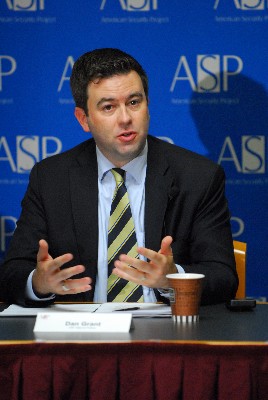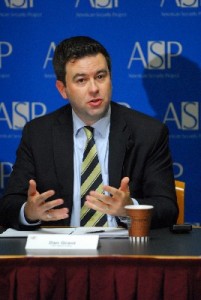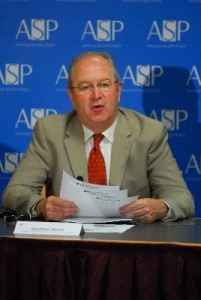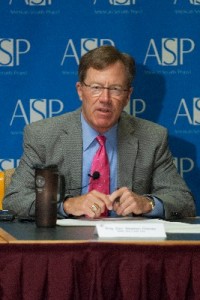
Event Review- The Transatlantic Trade and Investment Partnership: Implications for Global Security & Western-Chinese Relations
Podcast: Play in new window | Download
Subscribe: Apple Podcasts | RSS
This morning, the American Security Project hosted “The Transatlantic Trade and Investment Partnership: Implications for Global Security & Western-Chinese Relations,” a discussion regarding the proposed American-European trade agreement and the effect it may have on China.
The panel was moderated by the Honorable Glenn Nye, a former congressman and senior fellow at the German Marshall Fund. Geoffrey Harris of the European Parliament Liaison Office with the U.S. Congress, ASP fellow and consultant Dan Grant, and ASP CEO BGen. Stephen A. Cheney, USMC (Ret.) also participated in the panel discussion.
Following a brief introduction from the moderator, Dan Grant explained the context of the Transatlantic Trade and Investment Partnership, or TTIP. Discussions on a comprehensive U.S.-EU trade deal are the consequence of both an effort to stimulate the world economy following the global recession and recent World Trade Organization (WTO) negotiations stalling in Doha, Qatar.
Grant reminded us that the TTIP has not received a significant deal of press coverage and has not been to controversial, “in stark contrast to how things unfolded with NAFTA twenty years ago.” This is the consequence of the relatively open transatlantic trade relationship that already exists, and the similarities between the American and European economies. The agreement has been pretty well-received, with almost universal support from government officials, businesses, and labor groups.
So if everyone agrees that the TTIP will be beneficial, why is it worth discussing? Grant emphasizes that in the modern economy, it is “regulatory power that really makes the difference.” Consequently, the impact of trade regulations on the world’s largest developing economy, China, will be noteworthy. While it is challenging for the United States alone to combat China on rules and regulations, it will be more successful with the European Union on our side. Moreover, with the potential to complete the Trans-Pacific Partnership (TPP) as well, the United States will have more regulatory influence over China.
Geoffrey Harris added that China does not have to miss out on the economic benefits of the trade agreement. By joining in on the trade liberalization process, China can turn a “win-win arrangement” for the U.S. and EU into a “win-win-win” affair. Harris emphasized that while seeing an agreement among China’s two largest trading partners may seem like an attack, it was not at all a motivation for the TTIP. The purpose is simply to encourage economic growth in Europe and the United States.
Harris also emphasized Europe’s commitment to all of its allies. While the TTIP will be beneficial to the EU and the U.S., it may potentially have an adverse effect on third countries such as Canada, Mexico, and Australia. The impact on these allies, he noted, will certainly be on the European agenda.
Stephen Cheney pointed out that universally supported policies, such as the Law of the Sea Convention, are often unable to get passed, but is “far more optimistic about TTIP.” He referenced America’s declining competitiveness and the security advantages of completing the trade deal. Cheney reiterated Harris’s belief that the TTIP is not a threat to China. “We would certainly hope that China joins TPP,” BGen. Cheney affirmed.
In response to the daunting challenge of aligning regulations between the U.S. and EU, Grant believes the task of sorting through the regulations “is why the negotiations are happening.” Although it will be difficult, the long-term advantages will be great enough for the United States and Europe Union to complete the TTIP.
Addressing public interest in a noncontroversial trade deal, the panel noted that the benefits are tangible enough for the public to support the TTIP. Cheney cited estimates that GDP will grow, unemployment will drop, and wages will increase, and asked, “Where’s the disadvantage?” He did not believe selling the trade deal to public officials and their constituents would be an issue.
To conclude, the panel encouraged engaging China regarding its concerns about the TTIP. Harris reemphasized the deal is not meant to antagonize anyone, and we must consequently make sure the government of China understands this. “Where there is miscommunication, there has to be communication,” Harris explained, encouraging American and European diplomats to directly talk to the Chinese.
In his final remarks, Grant pointed out that trade is competition, “but isn’t of ill intent.” The Transatlantic Trade and Investment Partnership could be an agreement with global benefits. It will certainly advantage the United States and European Union. If they decide to come along for the ride, the Chinese, and many others, could benefit as well.
To read ASP’s fact sheet about the TTIP, click here:
To listen to the event, click below:
TTIP: Implications for Global Security & Western-Chinese Relations, a set on Flickr.




















[…] You can read about this event here […]